Spiders are generally nocturnal, which means they are most active at night and rest on their web or hide during the day. So, don’t be surprised if you suddenly wake up at night if a spider is crawling on your bed. Most spiders are harmless to humans, but it does not mean you should allow them to roam around your bed.
But, how do you keep spiders out of your bed? Most spiders are excellent climbers, so reduce their chances of climbing to your bed easily. Move your bed away from the wall and furniture and avoid putting anything under your bed. Always shake your pillows, bed sheet, and blanket before going to your bed.
For the record, spiders are not insects but rather arachnids. They have eight legs, and they don’t have antennae. There are over 45,000 different species of spiders in the world, but only around 25 of them are considered scary. In the US, the black widow, tarantulas, and brown recluse are the most feared species. Continue reading to learn more about them.
What Causes Spiders in Your Bedroom?
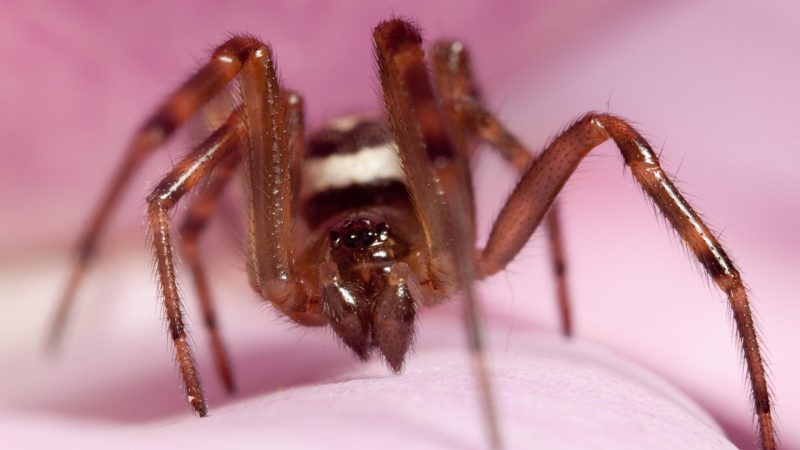
Generally speaking, spiders prefer the outdoors, where there are lots of insects to prey on. In most cases, they enter your bedroom unintentionally through small openings. However, these creepy creatures also go indoors because they are tempted to.
Here are some reasons why spiders will enter your bedroom.
- Your bedroom is warm enough to attract spiders, especially in the early fall.
- There are lots of mosquitoes in your bedroom.
- Your lampshade is too bright. Most small insects are attracted to light in the dark, and spiders take advantage of them.
- Your floor or walls are wet. Most spiders are attracted to water.
Do Spiders Crawl on You at Night?
Spiders don’t treat people as a source of food, and they don’t suck human blood. Therefore, they are very unlikely to crawl on you at night and will not attack you while you are sleeping. Spiders crawling at night are very likely searching for food or a warm place to hide.
Can a Spider Live In Your Mattress?
A spider cannot live on your mattress. Spiders tend to avoid humans, and they are sensitive when it comes to sound and vibration. So, if there’s a spider in your mattress or bed and you suddenly enter your bedroom, it will leave at once. Aside from that, spiders will also not live in places where there is no food source.
What to Do if a Spider Is on Your Bed?
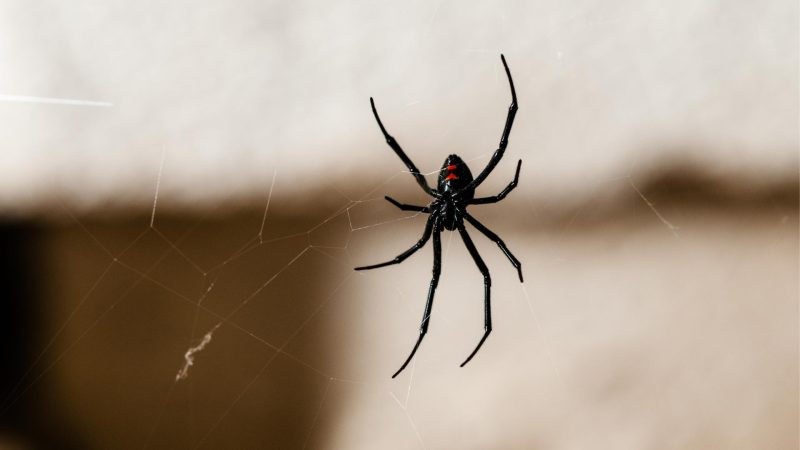
Technically speaking, spiders are considered beneficial pests because they feed on nuisance pests such as cockroaches and mosquitoes. On the other hand, some of them are toxic, and their bites can be extremely painful. So if you see a spider on your bed, here are some of the things you should and should not do:
1. Don’t panic.
Stay calm and don’t panic. Studies show that spiders are afraid of humans and loud noises. Once you scream, the spider will hide somewhere else if it cannot find its way out, especially if your door and windows are closed.
2. Move slowly.
If you’re on your bed, get off slowly and avoid disturbing the spider so it won’t crawl away. If you are not in your bed, walk carefully away from it and open your window widely. Then, drive the spider out of your house through the window.
3. Identify the spider.
If possible, try to identify the type of spider you saw on your bed. This can be challenging, but it can help you decide on your next move. But regardless of the species, spiders don’t bite humans unless they feel threatened or provoked.
4. Catch the spider.
Avoid killing a spider. Instead, capture it using glass and a piece of cardboard or any hard paper. Slowly cover the spider with the glass and place the paper under the glass. Afterward, release the spider far from your home.
5. Vacuum the spider.
If killing a spider is the last option, don’t smash it to death. Otherwise, it may be pregnant, and lots of baby spiders will emerge, which will cause more trouble. Instead, suck it up with a vacuum cleaner and throw away the vacuum bag.
What Do Bed Spider Bites Look Like?
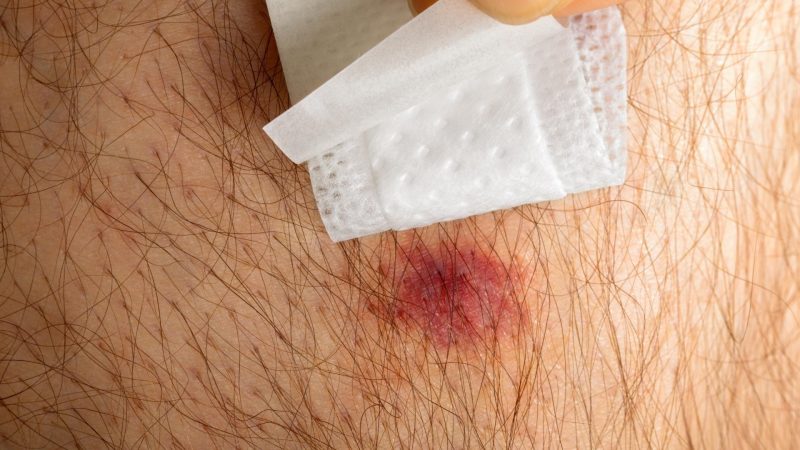
Spider bites look like bug bites and may cause redness or bump on your skin. Normally, a person bitten by a spider will not immediately notice it or will feel any symptoms. This is because their fangs are too small to break your skin. In fact, you’ll find it hard to confirm a spider bite unless you saw the spider bite you.
Most spider bites are also not dangerous because the venom is too weak to harm humans. On the other hand, bites from black widows look similar but may cause skin swelling, abdominal cramping, vomiting, and nausea. This is because their fangs are long, and their venom is stronger. Symptoms may last for 3 days.
Meanwhile, bites from brown recluse spiders somehow look different. At first, it is mildly red and will reveal fang marks. Within a few hours, the bite site will turn purple or dark blue with a red ring around it and will look like a bull’s eye on a dartboard. Some recluse spider bites look dry, sinking patches with irregular edges.
Related: Can Spider Bites Look Like Bed Bug Bites? | Important Facts!
How to Prevent Spider Bites in Bed?
The best preventive measure against spider bites in bed is not to allow them to climb into your bed. However, some spiders can still climb onto your bed and may accidentally bite you. So, in case there’s a spider in your bed while you are sleeping, here are some tips on how to protect yourself from spider bites:
- Wear long sleeves, pajamas, and socks. Spiders cannot bite through clothes.
- Avoid turning when trying to go to sleep. Spiders bite once you accidentally roll over them.
- Mix the essential oil of eucalyptus or citronella with water and apply it to your skin. However, some essential oils can cause allergic reactions.
- Use insect repellents with DEET but follow directions carefully. DEET is a chemical that can have a negative effect, especially on small children.
How to Get a Spider Out From Under Your Bed?

You might not have encountered a spider on your bed yet. However, they might be already under your bed just waiting for the right moment. In case you find one, the best thing to do is get it out of there. Below are some useful tips to get a spider out from under your bed:
- If you are brave enough to pick it up, wear gloves while picking it up to protect your hand in case the spider bites you.
- If you’re scared to pick it up, block all its possible ways out except for one where you can catch the spider without touching it.
- Use the glass-and-paper technique mentioned above.
How to Lure a Spider Out From Under Your Bed?
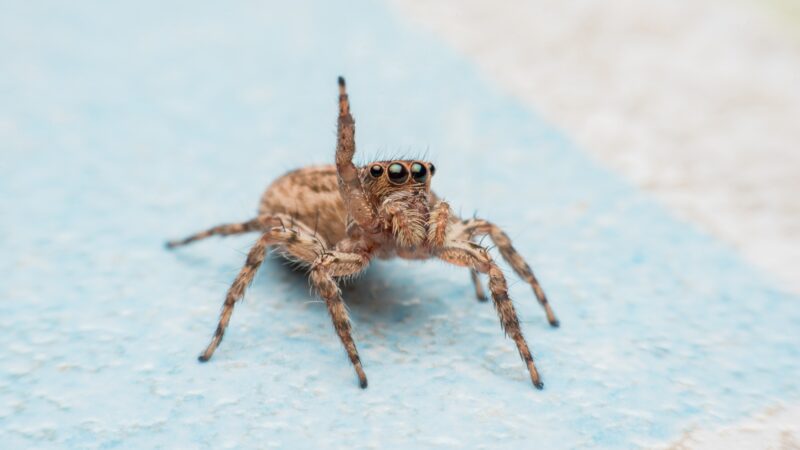
For some reason, you might not be able to remove a spider under your bed. Therefore, your next option is to attract it or use bait so it will leave the area. Here are two effective ways to lure a spider from under your bed:
1. Use small insects or roaches as bait.
Spiders eat cockroaches, crickets, and other small insects. If you can catch some of them, place them inside a tall container and leave them under your bed. However, the spider may leave after eating while you are still sleeping.
2. Use pheromone spider traps.
Pheromones are chemicals from an animal that attracts another animal of the same species. Pheromone spider traps such as Terro T3206 Spider & Insect Trap have very sticky glue on them that will prevent spiders from escaping.
- Traps and kills spiders, ants, cockroaches, crickets, and other...
- Kills the “Big 3” – brown recluse, black widow, and hobo...
- Easy-to-use traps can be used flat or folded
- Use folded to hide insects from view or use flat for a larger...
- Use around the home against baseboards, in corners, behind doors,...
How Do I Get Rid of Spiders in My Bedroom Naturally?
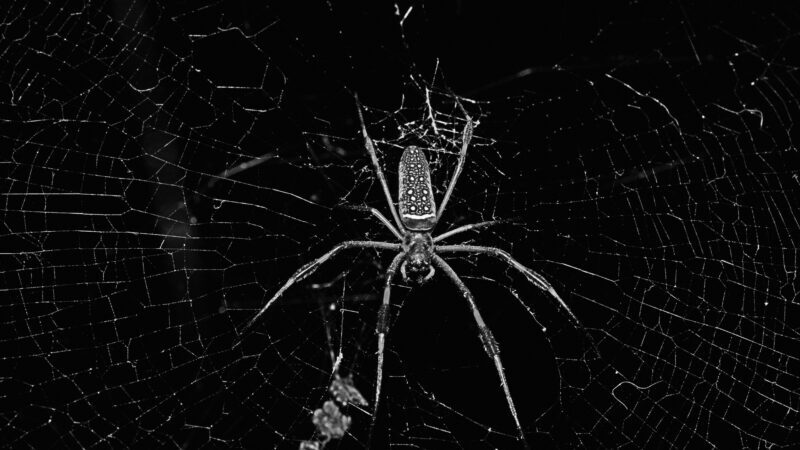
Most insecticides can kill spiders and can control them effectively. However, such products contain harmful chemicals that can kill spiders and are also dangerous to humans. Therefore, here are some effective ways to get rid of spiders naturally.
1. Spray essential oils.
Diluted essential oils of peppermint, eucalyptus, citronella, lemon, and lavender repel spiders and insects. However, there are only a few scientific studies proving the effectiveness of essential oils. You also have to spray them from time to time because the scent will soon evaporate, and spiders may come back later.
Related: Does Peppermint Oil Repel Spiders? | All You Need to Know!
2. Clean your home regularly.
Aside from your bedroom, spiders can also hide in other rooms in your house. They hide in empty boxes, under the stairs, underneath your appliances, behind the refrigerator, inside your closets, and in other dark spaces. Deep clean every corner of your house regularly and destroy all the cobwebs that you find.
3. Seal potential points of entry.
This includes making sure that window screens are always closed and have no damage. It also involves caulking of all the cracks and crevices in your home’s foundation, and installation of weather stripping on window openings and door sweeps. Also, store your firewood, lumber, and woodpiles far away from your house.
What Does Vinegar Do to Spiders?
Vinegar repels spiders, but it cannot kill them. Spiders hate the foul odor and the sour taste of vinegar. They can smell very well using the fine hairs on their legs. To repel spiders, mix equal parts of water and vinegar and spray it to them or their cobwebs. You can also mix vinegar with orange peel or hot chili sauce.
Related: Vinegar As Spider Repellent: How To Use Vinegar To Get Rid of Spiders?
How to Spider-Proof Your Bed?
Once again, spiders are not interested in you or your bed unless you have something that they can eat or can help them keep warm. On the other hand, they might accidentally crawl on you while you are sleeping. To ease your worries, here are some effective ways to make your bed spider-proof.
- Don’t let your bed touch the walls, furniture, table, or anything that can help spiders climb to your bed.
- Make sure there’s almost no gap between your door and the floor of your bedroom. If necessary, place a rug on the gap.
- Always close the door immediately upon entering your bedroom.
- Replace damaged window screens.
- Always close your cabinet and drawers properly.
- Clean your room of clutter. This will prevent spiders from finding places to hide.
- Use sticky traps such as Catchmaster 30 Brown Recluse Spider Traps . These traps are non-toxic, inexpensive, and effective against any kind of spider.
- READY TO USE: Catchmaster Insect, Cricket, Cockroach and Spider...
- YEAR ROUND PROTECTION: Catchmaster spider traps for inside your...
- INDOOR USE: Observe pest infestation with Catchmaster glue traps....
- KEEP PESTS OUT: Our glue traps for bugs & insects are a clean,...
- INTELLIGENT PEST MANAGEMENT: At our core, we are dedicated pest...
List of Sources
Vetter, R. S. (2020). Spiders. University of California Agriculture & Natural Resources.
Things you can do to reduce the chances of being bitten by brown recluses. (2019). University of California, Riverside – Spider Research.
Peairs, F. B., Cranshaw, W. S., Cushing, P. E. (2013). Spiders in the Home. Colorado State University Extension.
Houseman, R. M. (2003). Spiders. University of Missouri Extension.
- How to Get Rid of Copperheads | Practical Guide - August 27, 2023
- How to Get Rid of Corn Snakes | What Makes Them Aggressive? - August 27, 2023
- How to Get Rid of Alligators | Safety Measures and Removal Methods - July 16, 2023


